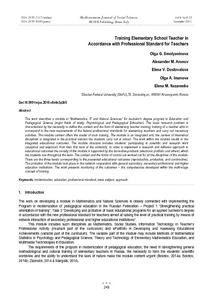Training Elementary School Teacher in Accordance with Professional Standard for Teachers
Скачать файл:
URI (для ссылок/цитирований):
https://elib.sfu-kras.ru/handle/2311/27869Автор:
Иманова, О. А.
Смолянинова, О. Г.
Достовалова, Е. В.
Аронов, А. М.
Назаренко, Е. М.
Коллективный автор:
Институт педагогики, психологии и социологии
Кафедра информационных технологий обучения и непрерывного образования
Дата:
2015-11Журнал:
Mediterranean Journal of Social SciencesКвартиль журнала в Scopus:
Q3Библиографическое описание:
Иманова, О. А. Training Elementary School Teacher in Accordance with Professional Standard for Teachers [Текст] / О. А. Иманова, О. Г. Смолянинова, Е. В. Достовалова, А. М. Аронов, Е. М. Назаренко // Mediterranean Journal of Social Sciences. — 2015. — Т. 6 (6 S3). — С. 245-257Аннотация:
The work describes a module in “Mathematics, IT and Natural Sciences” for bachelor’s degree program in Education and
Pedagogical Science (major fields of study: Psychological and Pedagogical Education). The basic research problem is
characterized by the necessity to define the content and the form of elementary teacher training; training of a teacher able to correspond to the new requirements of the federal professional standards for elementary teachers and carry out necessary activities. The module content offers the model of such training. The module is an integrated unit; the content of theoretical disciplines is integrated in the practical session the students carry out at school. The work within the module results in the integrated educational outcomes. The module structure includes students’ participating in scientific and research work (analytical and empirical) from their first term at the university. In order to implement a research and reflexive approach to educational outcomes the novelty of the module is supported by the innovative products (electronic portfolio and others) which the students use throughout the term. The content and the forms of control are worked out for all the disciplines of the module. There are the three levels corresponding to the presented educational outcomes (reproductive, productive, and constructive). The probation of the module took place in the network cooperation with general secondary, secondary professional and higher education institutions. The work presents monitoring of the outcomes – the competencies developed within the multi-stage concept of training.

